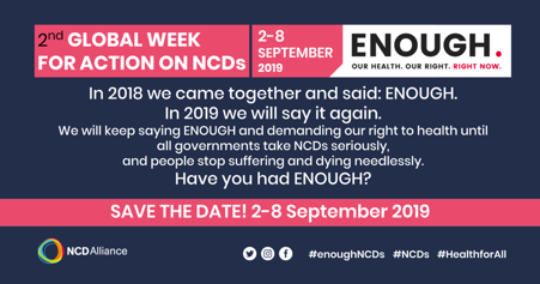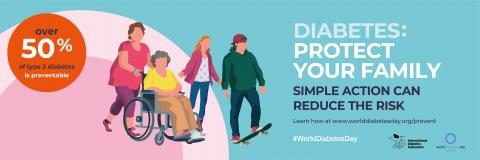Countdown to the 2nd Global Week for Action on NCDs, 2–8 September 2019
Mark your calendars: the 2nd Global Week for Action on NCDs, held from 2–8 September 2019, will focus on noncommunicable diseases (NCDs) and universal health coverage (UHC) – in advance of the first High-Level Meeting on UHC in September 2019.

The Global Week for Action on NCDs will build on the success and enthusiasm for the first Global Week for Action on NCDs as a global opportunity to talk to leaders, to media, to crowds, and to the world about the importance of integrating NCDs across all aspects of UHC, while reiterating the need for governments to act on commitments to improve health for all through NCD prevention and control, which will result in the improvement of health and lives of all people in all places.
The opportunities are endless. Possible activities include organizing a meeting, community conversation, picnic, fun run, dance party, or art competition. The week is your chance to do something achievable, appropriate, relevant and impactful where you live, but linked to a global movement.
- Together we say ENOUGH.
- Together we’ll celebrate progress and leadership.
- Together we’ll call for action on commitments.
- It’s time to deliver on NCDs and health for all.
More information is coming soon, but you can already start planning and contact the NCD Alliance to share ideas about what you will do to mobilize your leaders and community for action on NCDs.
Did you know? Oral diseases are the most prevalent NCDs worldwide
Oral health is key to general health and well-being at every stage of life, yet basic oral health services remain out of reach for millions of people. More than half of the world’s population (3.5 billion) suffer from untreated oral diseases, which can result in pain, infection, tooth loss and loss of productivity. Integrating oral health into UHC will help improve oral health outcomes and reduce inequalities in access to care. Countries at all income levels can take steps to move closer to develop and implement their own UHC package of essential health services that integrates oral health and fits the needs of their population.
Part of this article was originally published by the ENOUGH. campaign.

